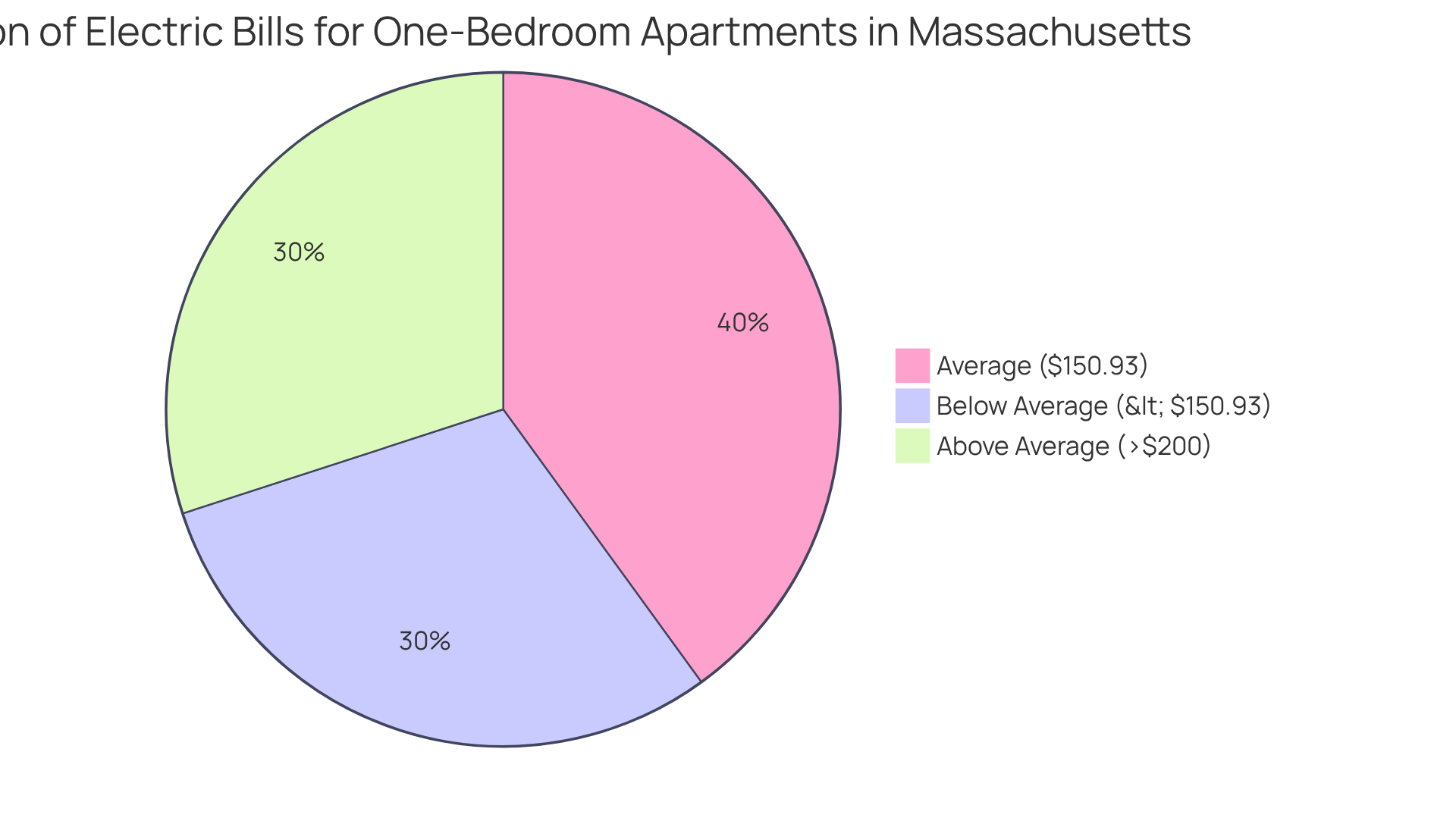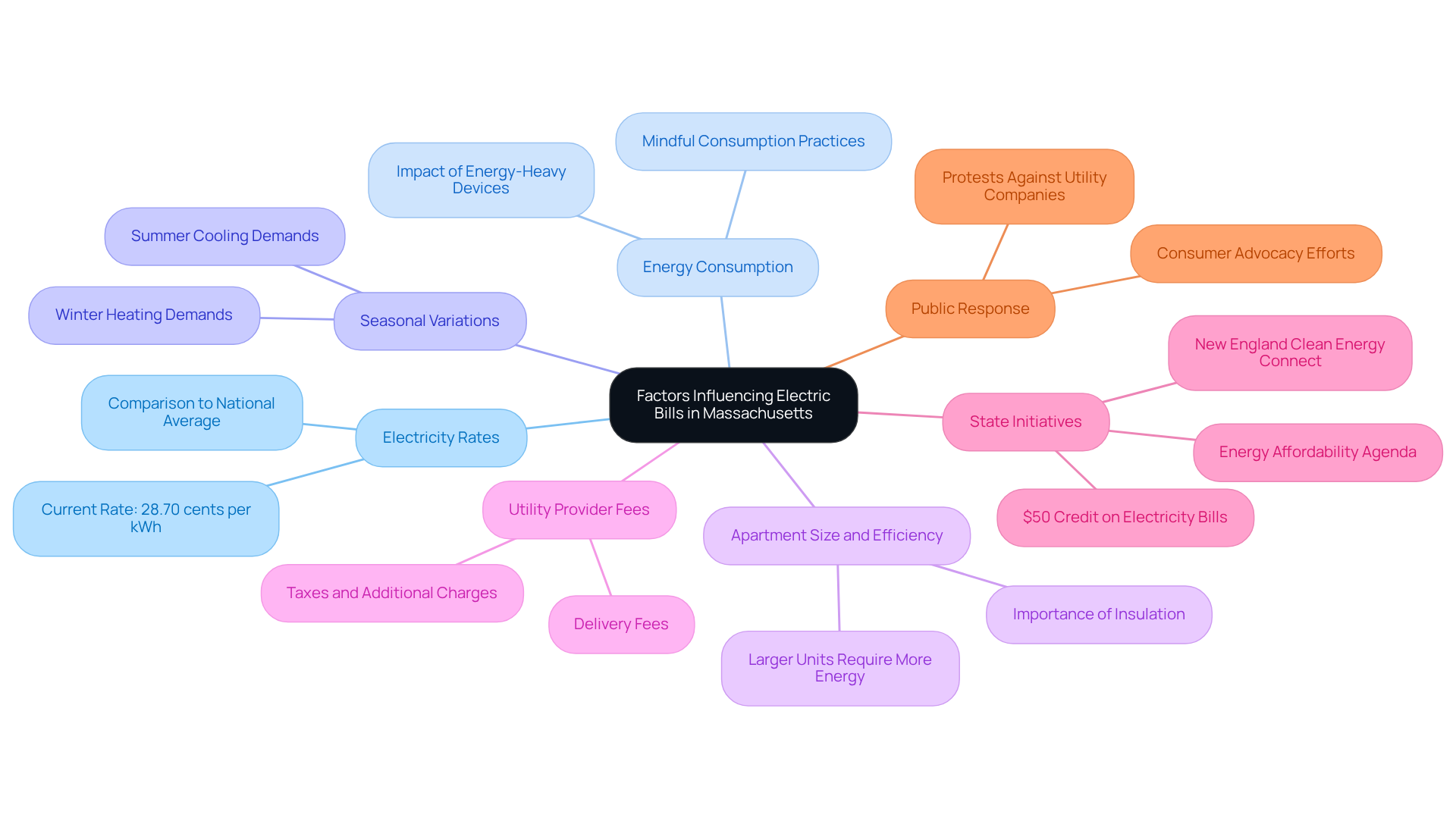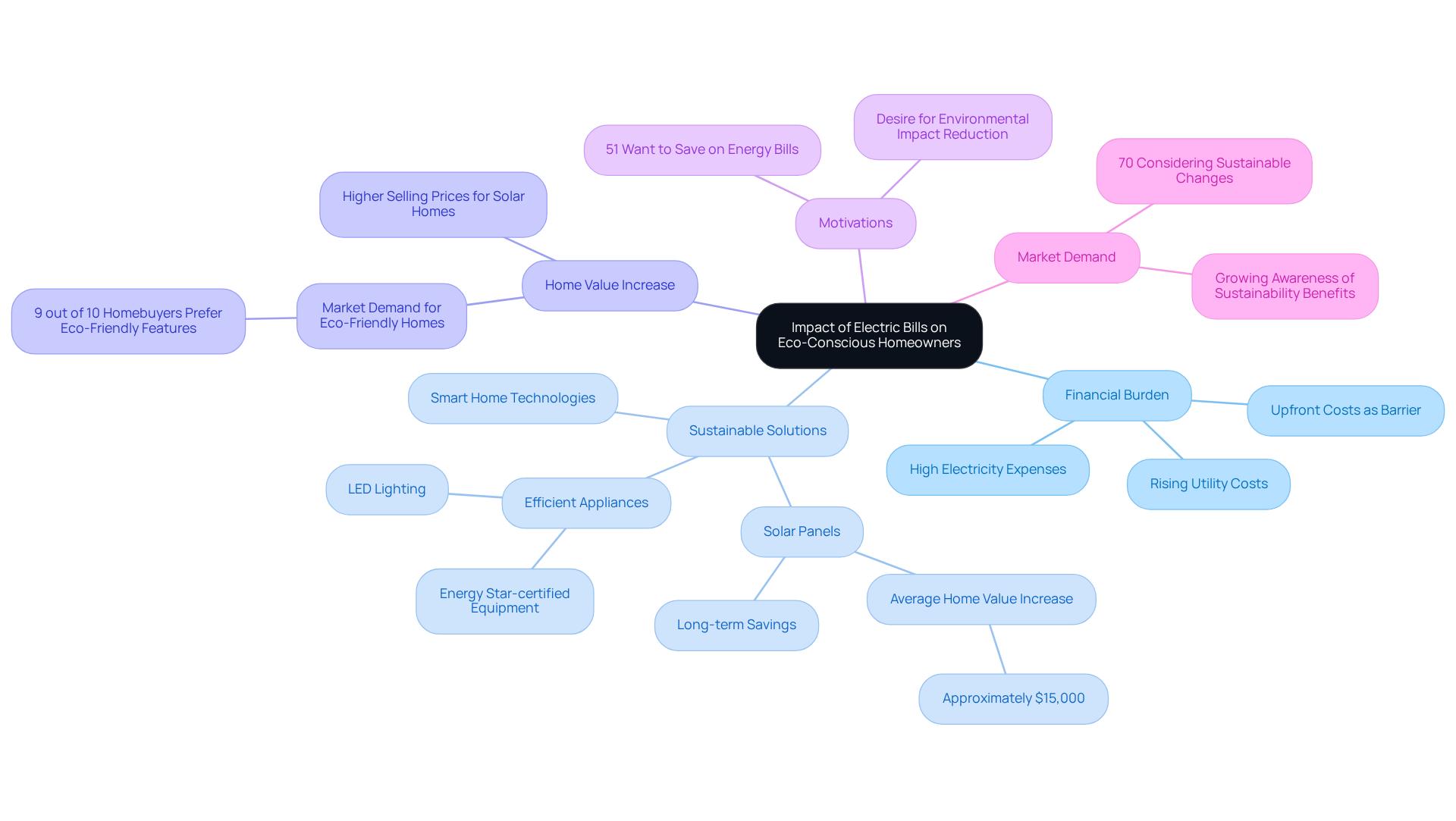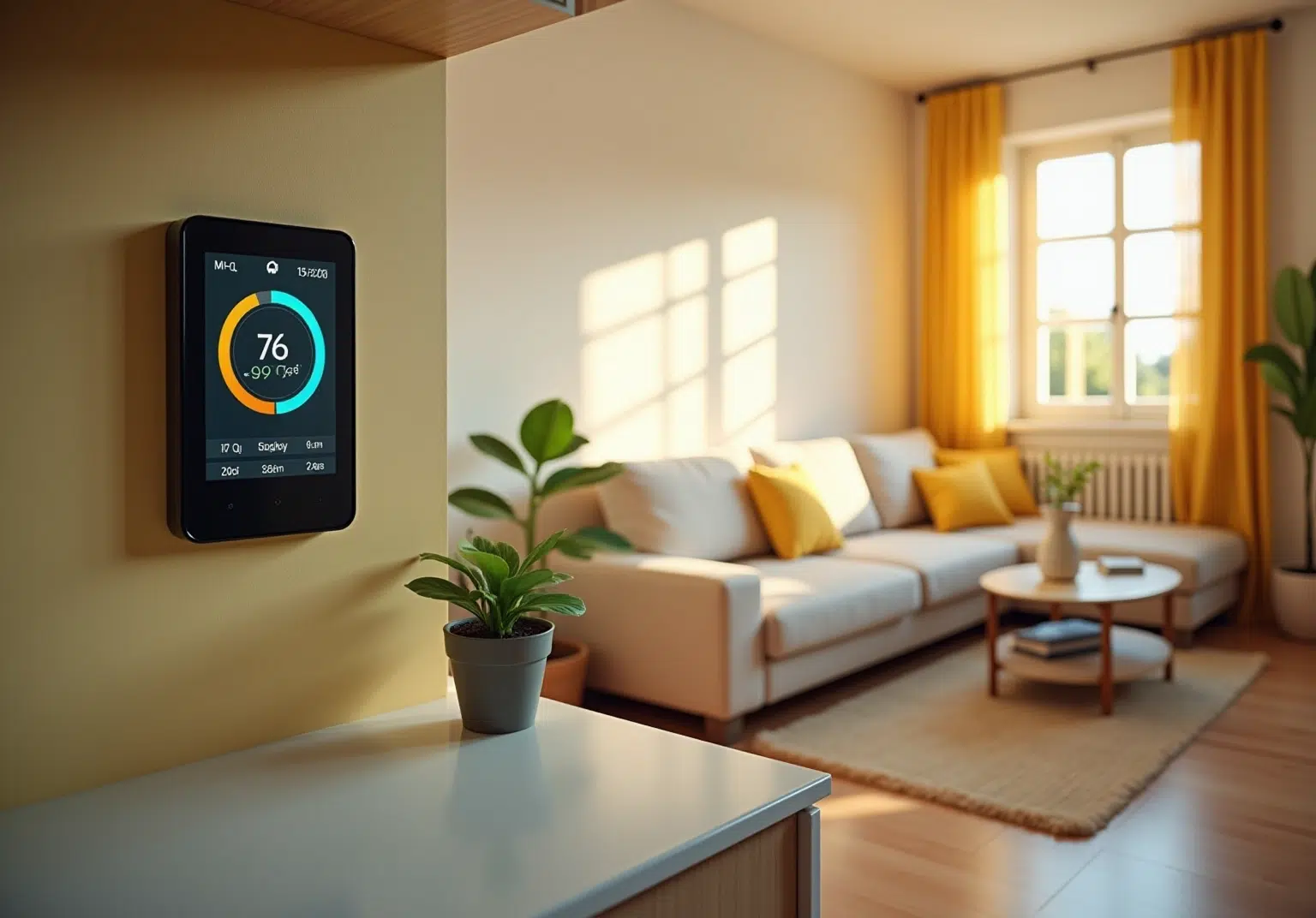Overview
We understand that managing your electric bill can be a source of concern, especially when the average bill for a 1-bedroom apartment in Massachusetts is around $150.93 per month. This figure is influenced by various factors, including location, energy consumption, and seasonal changes. It’s common to feel overwhelmed by how rising electricity rates and utility fees can lead to fluctuations in your monthly expenses. However, understanding and managing your energy usage is crucial for effective budgeting.
Have you considered the benefits of solar energy? Embracing sustainable solutions not only helps mitigate these costs but also paves the way for energy independence. Imagine a future where your energy needs are met without the stress of unpredictable bills. Together, we can explore how solar energy can transform your relationship with electricity, providing both financial relief and peace of mind.
Let’s take this journey towards energy independence together. By understanding your energy habits and making informed choices, you can create a more sustainable future for yourself and your community. If you’re ready to learn more about how we can support you in this endeavor, please reach out. Your path to a more manageable electric bill starts here.
Introduction
Navigating the financial landscape of living in Massachusetts can feel overwhelming, particularly when it comes to managing monthly electric bills. For residents of one-bedroom apartments, the average electric bill hovers around $150.93. However, this figure is influenced by a myriad of factors, from energy consumption habits to seasonal changes. As costs continue to rise, it’s common to feel the weight of budgeting for these expenses. Yet, there’s hope in exploring innovative solutions to mitigate them.
What strategies can renters embrace to lower their electric bills while fostering a more sustainable lifestyle? Together, we can uncover meaningful ways to make a difference.
Define the Average Electric Bill for a 1 Bedroom Apartment
We understand that managing monthly expenses can be a significant concern for tenants, especially when it comes to electricity costs. In Massachusetts, the average electric bill for a 1 bedroom apartment is approximately $150.93 per month as of 2025. However, this figure can fluctuate due to various factors, such as:
- Location within the state
- The efficiency of the apartment
- The lifestyle of the residents
For instance, if your apartment lacks air conditioning or heating, you might notice reduced expenses. Conversely, those who use more energy could see costs exceeding $200 each month. Recognizing the average electric bill for a 1 bedroom apartment in Massachusetts is crucial for effective budgeting and considering energy-saving measures.
As you reflect on your energy habits, it’s common to feel overwhelmed by rising costs. But there are sustainable solutions available that can not only ease your financial burden but also contribute to energy independence. Imagine the benefits of harnessing solar energy—reducing your reliance on traditional electricity sources while potentially lowering your monthly bills.
Together, we can explore these options and find ways to make your home more energy-efficient. Let’s work towards a solution that supports your financial goals and promotes a sustainable lifestyle. If you’re interested in learning more about how you can take action, please reach out for guidance and support. Your journey toward starts here.

Explore Factors Influencing Electric Bills in Massachusetts
As residents of Massachusetts, we understand that the average electric bill for a 1 bedroom apartment in Massachusetts can be a source of concern, especially as we look ahead to 2025. Several factors significantly influence these expenses, and being informed can empower you to make better choices for your home.
- Electricity Rates: The average price of electricity in Massachusetts has surged to approximately 28.70 cents per kWh, notably higher than the national average. This increased rate directly impacts your monthly expenses, highlighting the importance of understanding the average electric bill for a 1 bedroom apartment in Massachusetts and how much energy you use.
- Energy Consumption: The total amount of electricity consumed is a critical determinant of monthly costs. If your household relies on energy-heavy devices, like electric heaters or air conditioning systems, you may notice a significant rise in the average electric bill for a 1 bedroom apartment in Massachusetts. Reflecting on your energy habits can lead to more mindful consumption.
- Seasonal Variations: It’s common to feel the pinch during the winter months due to heating demands and in the summer due to air conditioning usage. This seasonal fluctuation can lead to considerable variations in your monthly bills, making it vital to plan accordingly.
- Apartment Size and Efficiency: The dimensions and power efficiency of your residence play a vital role in resource consumption. Larger units or those lacking adequate insulation may require additional energy to maintain comfortable temperatures, which can significantly affect the average electric bill for a 1 bedroom apartment in Massachusetts.
- Utility Provider Fees: Additional charges imposed by utility companies, including delivery fees and taxes, can further increase your overall amount. Understanding these fees is crucial for anyone looking to and potentially reduce their average electric bill for a 1 bedroom apartment in Massachusetts.
- State Initiatives: Thankfully, the Massachusetts government has introduced helpful measures, such as a $50 credit on electricity expenses and the Energy Affordability Agenda, aimed at alleviating the burden of rising costs for residents. Furthermore, the New England Clean Energy Connect transmission line is expected to provide about 20% of the state’s electricity needs, potentially reducing ratepayer bills by approximately $50 million annually.
- Public Response: It’s heartening to see that there has been considerable public outcry concerning increasing utility expenses, with organized protests against service providers emphasizing the urgent need for consumer advocacy and legislative measures.
By acknowledging these aspects, we can work together to make informed choices that help regulate our power consumption efficiently and lessen the impact of rising electricity expenses. Remember, you are not alone in this journey, and together we can explore solutions that foster energy independence and sustainability.

Assess the Impact of Electric Bills on Eco-Conscious Homeowners
For eco-minded homeowners, the burden of high electricity expenses can weigh heavily, prompting a search for sustainable solutions. The financial strain of rising utility bills often leads individuals to consider alternatives like solar panels, which can significantly reduce monthly payments over time. On average, solar installations can increase a home’s value by approximately $15,000, making them a wise investment for those looking to enhance their property while alleviating utility costs. Furthermore, 51% of participants noted that reducing expenses on utility bills is their primary motivation for contemplating sustainable home improvements.
It’s common to feel overwhelmed by energy costs, but environmentally aware homeowners often find solace in investing in efficient appliances and smart home technologies that optimize energy use, further decreasing their reliance on the grid. In fact, 9 out of 10 home purchasers prefer residences with eco-friendly attributes that lower utility expenses, highlighting a growing market demand for such enhancements. Transitioning to sustainable energy not only eases financial burdens but also contributes to environmental preservation, aligning with the values of those committed to minimizing their carbon footprint.
Understanding the empowers homeowners to make informed choices that benefit both their finances and the planet. As the trend toward renewable energy adoption continues to flourish, with 70% of Americans making or considering changes to enhance sustainability, homeowners can take proactive steps to improve their living spaces. Together, we can create a more efficient and eco-friendly home, paving the way for a brighter future.

Conclusion
Understanding the average electric bill for a one-bedroom apartment in Massachusetts is crucial for residents striving to manage their monthly expenses effectively. With an average bill of approximately $150.93 as of 2025, various factors such as location, energy consumption, and seasonal variations can significantly influence this figure. We understand that being aware of these elements not only aids in budgeting but also encourages tenants to adopt energy-saving practices that can lead to lower costs and a more sustainable lifestyle.
Several key insights have emerged from the discussion on electric bills:
- The rising electricity rates in Massachusetts, currently around 28.70 cents per kWh, highlight the need for residents to evaluate their energy habits and consumption patterns.
- It’s common to feel overwhelmed by these rising costs, but state initiatives, such as the Energy Affordability Agenda, aim to alleviate the financial burden of high utility costs.
- Moreover, public advocacy for consumer rights reflects a growing concern over electricity expenses.
By considering these factors, individuals can take proactive steps toward reducing their monthly bills.
Ultimately, the journey toward energy independence and sustainability begins with informed choices. Embracing eco-friendly practices, such as investing in energy-efficient appliances or exploring solar energy options, not only mitigates financial strain but also contributes to a healthier planet. As the demand for sustainable living grows, residents are encouraged to take action and explore solutions that align with their financial goals and environmental values. Together, we can pave the way for a brighter and more sustainable Massachusetts, ensuring that a more energy-efficient future is within reach.


